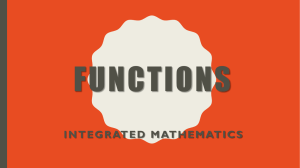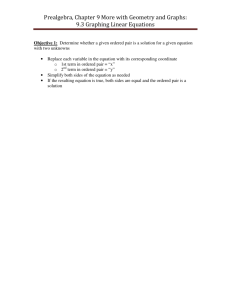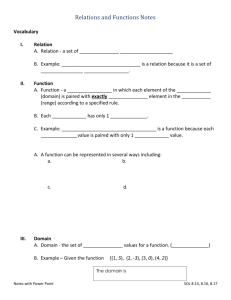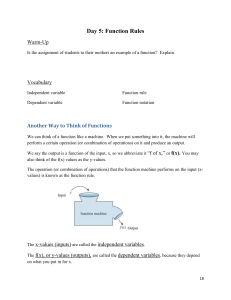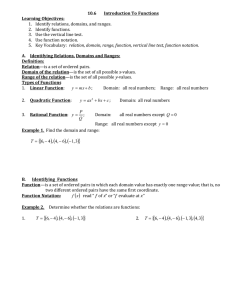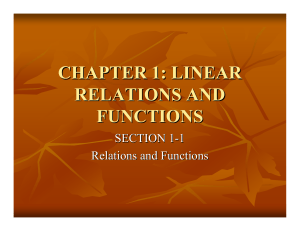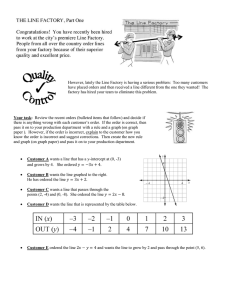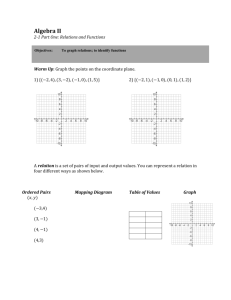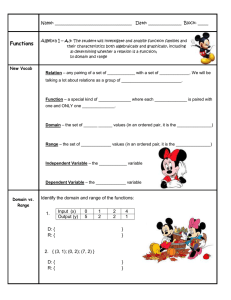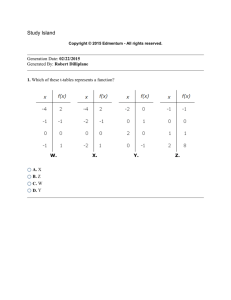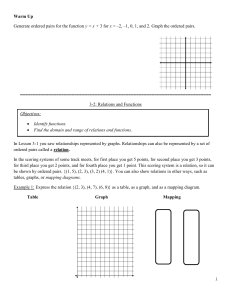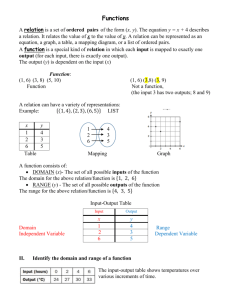Relations and Functions: SOL 8.14, 8.16, 8.17
advertisement
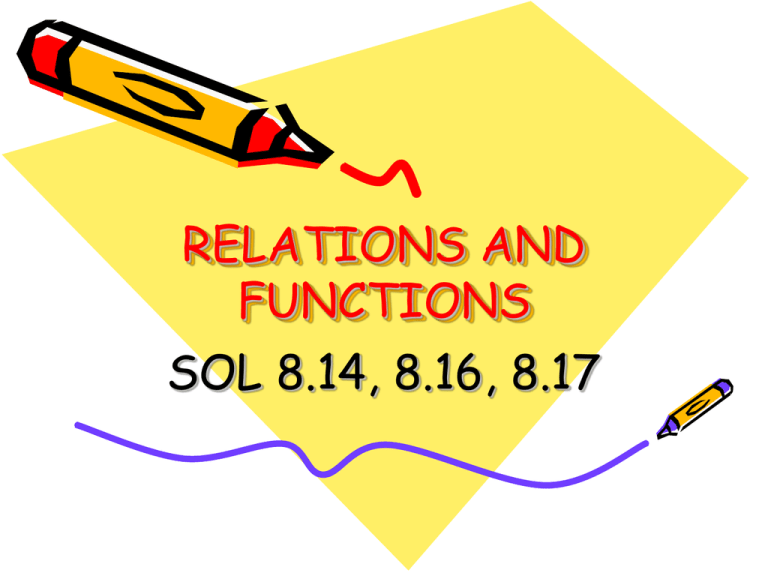
RELATIONS AND
FUNCTIONS
SOL 8.14, 8.16, 8.17
Vocabulary
• Relation: A relation is a set of
ordered pairs.
x
y
2
5
3
0
-2
8
Relation
This chart is a relation
because it is a set of
ordered pairs.
Relations can be represented in multiple
ways, including as ordered pairs, a table, a
mapping, or as a graph.
Vocabulary
• Function: a relation in which each
element of the input (domain) is
paired with exactly one element in
the output (range) according to a
specified rule.
• Each x has only 1 y.
Function
• Example:
{(1, 2), (2, 2), (-4, 3), (0, 3)}
is a function because each x
value is paired with only 1 y
value.
Functions
• A function can be represented in
several ways, including:
a. Ordered Pairs:
{(1,2), (-3,1), (0,4), (2, -5)}
Functions
• b. Words:
Movie tickets cost $11.00 each.
For each movie ticket bought, it
will cost $11.00.
Relations
• c. Table:
X
Y
1
2
-2
4
3
0
4
5
Relations
• d. Graph:
Vocabulary
• Domain: the set of input values
for a function. (x-values)
Domain
• Example:
Given the function:
{(1, 5), (2, -3), (3, 0), (4, 2)}
The domain is {1, 2, 3, 4}
Vocabulary
• Range: the set of output values
for a function. (y-values)
Range
• Example:
Given the function:
{(1, 5), (2, -3), (3, 0), (4, 2)}
The range is {-3, 0, 2, 5}
Vocabulary
• Linear Equation: an equation
for which the graph is a
straight line.
Linear Equation
• Example:
y = 2x + 3
Vocabulary
• Function table: a table used to
organize the input numbers,
output numbers, and the
function rule.
Function Table
Example:
Given y = 2x + 3, create a function
table.
x
y = 2x + 3
y or f(x)
Function Table
Example:
Given y = 2x + 3, create a function
table.
x
-1
y = 2x + 3
y = 2(-1) + 3
y or f(x)
1
Function Table
Example:
Given y = 2x + 3, create a function
table.
x
-1
0
y = 2x + 3
y = 2(-1) + 3
y = 2(0) + 3
y or f(x)
1
3
Function Table
Example:
Given y = 2x + 3, create a function
table.
x
-1
0
1
y = 2x + 3
y = 2(-1) + 3
y = 2(0) + 3
y = 2(1) + 3
y or f(x)
1
3
5
Function Table
Example:
Given y = 2x + 3, create a function
table.
x
-1
0
1
2
y = 2x + 3
y = 2(-1) + 3
y = 2(0) + 3
y = 2(1) + 3
y = 2(2) + 3
y or f(x)
1
3
5
7
Vocabulary
• Independent Variable: The
independent variable is the
input (x) value.
• It is the value that you may
choose.
Vocabulary
• Note:
If time is an option, it will always
be the independent variable.
Examples of time: month, day,
year, minutes, seconds, hours,
etc.
Vocabulary
• Dependent Variable: The
dependent variable depends
on the independent variable
• It is the output (y) value.
